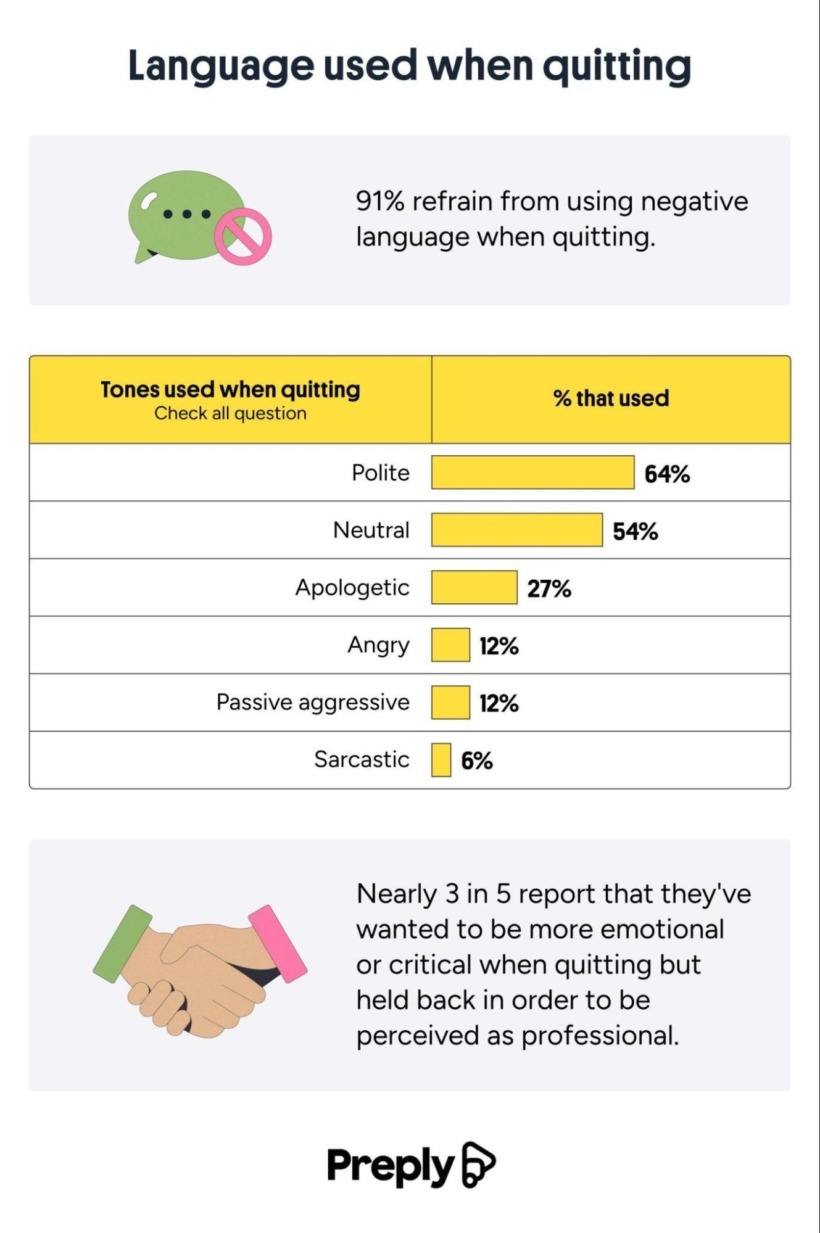Business Visualizations
Study Examines the Ways Americans Resign from Jobs
Over 1,000 Americans responded to a survey from the Preply team that studied how Americans communicate when they quit their jobs. In 2025, over 3 million Americans quit their jobs, clearly indicating resigning is a common occurrence. But this study reveals that people have different approaches to quitting, as well as some commonalities. The team’s analysis encompasses the methods used to resign as well as the tone, language, and feelings surrounding the resignation.
Click below to zoom.
Most Americans reported a verbal resignation. 76% of the survey responders used this direct and personal approach to quit their jobs, while only 9% gave a handwritten notice of resignation. That’s surprisingly fewer than the number who “ghosted” their employer at 19%. Around 10% of workers quit via text, leading to 43% reporting that their resignation only lasted a few minutes. Quitting can be awkward and uncomfortable, so it makes sense that people want to get the conversation over with. Those who quit in letter or text said they sent “just a few words.”
The next aspect the team considered was the tone and language used in the resignation. Naturally, many employees would want to avoid burning bridges when they quit. 91% of employees said they avoided using negative or critical language when resigning. 64% said they were conscious of using a polite tone, and 27% went as far as using apologetic tones and words. 60% of employees had to suppress their negative emotions and refrained from stating the critical reasons that led to their resignation.
There were some differences among ages and genders as well. Gen Z was the most restrained when resigning, with 61% stating that they held back emotions during the process. Boomers and Gen X were similar at 59% and 58% respectively. Millennials held back the least at 57%. As for gender, 63% of women said they suppressed their emotions and 53% of men reported the same. The team found that when employers offered exit interviews, 40% of workers felt more comfortable expressing their honest experiences at the company, which is important for companies that take worker experience and company culture seriously.
Most people said they avoided language, but here’s the specific breakdown of the tones they used when they quit:
- Polite – 64%
- Neutral – 54%
- Apologetic – 27%
- Angry – 12%
- Passive-aggressive – 12%
- Sarcastic – 6%
While people may hold back their negative feelings when resigning, that doesn’t mean these employees are above cutthroat tactics. One in eight people said they chose to resign at a time when they knew it would cause the most disruption and harm at work. Gen Z was the most likely to do this, and men were more likely than women. One in ten left negative or scathing reviews of their former company on sites like Glassdoor. Healthcare workers were the most likely to do this. These reviews often included negative words like “disorganized”, “stressful”, and “frustrating.” These written reviews often express things employers weren’t comfortable saying in person.
The trends and findings in this study provide a well-rounded look at a common experience, revealing surprising similarities among people in very different situations.
